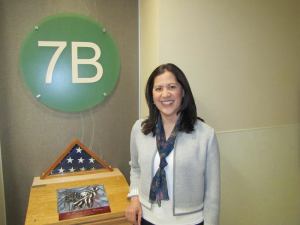National Nurses Week, May 6–12
By Deborah Jeanne Sergeant

Nursing is a field brimming with opportunities and challenges. Though it may seem more of the latter to many outside nursing, many of those called to nursing find it personally rewarding.
Registered nurse Pam Scripa, nursing manager in a telemetry medical surgical unit at the Syracuse VA Medical Center, said that her mother inspired her to become a nurse.
“I always liked helping people,” Scripa said.
In her mother’s 44 years of nursing, Scripa never heard her mother complain about her work.
“I have a very giving personality and have never been disappointed in my 29 years of nursing,” Scripa said.
Her biggest day-to-day challenge is trying to bridge the gap between the demands of the floor versus the rest of the hospital. She said that her floor has the highest patient turnover of the hospital. In recent years, it has grown from 1,200 to 2,200 patients monthly.
“We look at how to improve the patient experience and be efficient with diagnostic testing while making sure patient safety is the No. 1 priority,” Scripa. said.
On her toughest days, she turns to her colleagues as sounding boards and sources of encouragement.
She also likes the “open door” policy of the hospital, as employees are permitted to talk with the executives anytime they have an issue. Scripa feels that kind of access to the organization’s decision makers empowers employees who experience the most one-on-one time with patients.
Nurse practitioner Heide Parreno has worked in private practice for about 50 years. She emigrated from the Philippines in the 1970s to obtain more education. Eventually, Parreno earned her nurse practitioner degree and received further training in holistic nursing. She serves clients in the Rochester area.
Parreno said that she daily must advocate for patients and “deal with insurance companies” to obtain coverage for them. Operating her own practice has enabled her to treat patients holistically. She copes with the stressors of her profession by “keeping myself in balance and harmony, with others and with nature,” she said.
Parreno said that she enjoys nursing because of the positive difference she can make in people’s lives.
“I can help people obtain the good health that they want,” she added. “The way I define health is the ability to function in a manner acceptable to yourself and the community of which you are a part. That means that you have the right relationship with yourself, God and nature and the people you’re with. It’s not just the absence of disease.”
Nursing at a Glance
• “Nursing is the nation’s largest health care profession, with more than 3.1 million registered nurses nationwide. Of all licensed RNs, 2.6 million or 84.8 precent are employed in nursing.
• “Registered nurses comprise one of the largest segments of the US workforce as a whole and are among the highest paying large occupations. Nearly 58 percent of RNs worked in general medical and surgical hospitals, where RN salaries averaged $66,700 per year. RNs comprised the largest segment of professionals working in the healthcare industry.
• “Nurses comprise the largest single component of hospital staff, are the primary providers of hospital patient care, and deliver most of the nation’s long-term care.
• “Most healthcare services involve some form of care by nurses. In 1980, 66 percent of all employed RNs worked in hospitals. By 2008, that number had declined slightly to 62.2 percent, as more health care moved to sites beyond the hospital and nurses increased their ranks in a wide range of other settings, including private practices, health maintenance organizations, public health agencies, primary care clinics, home health care, nursing homes, outpatient surgi-centers, nursing-school-operated nursing centers, insurance and managed care companies, schools, mental health agencies, hospices, the military, industry, nursing education, and health care research.
• “Though often working collaboratively, nursing does not “assist” medicine or other fields. Nursing operates independent of, not auxiliary to, medicine and other disciplines. Nurses’ roles range from direct patient care and case management to establishing nursing practice standards, developing quality assurance procedures, and directing complex nursing care systems.”
Source: American Association of Colleges of Nursing (www.aacn.nche.edu).

